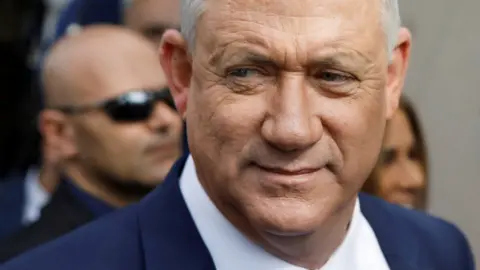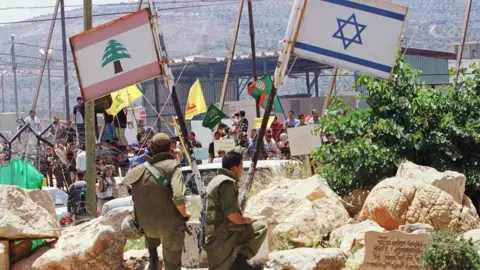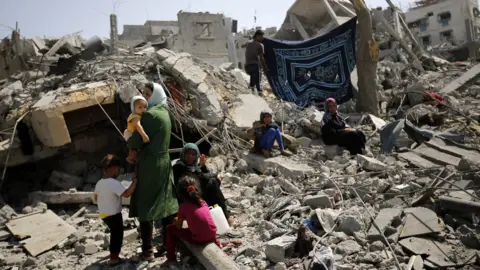Benny Gantz: The ex-military chief who will be Israel's next PM
 Reuters
ReutersFormer Israeli military chief Benjamin "Benny" Gantz is a newcomer to politics who is poised to become the country's next prime minister.
The leader of the centrist Blue and White party came closer than any other contender to toppling Benjamin Netanyahu in an unprecedented three elections between April 2019 and March 2020, preventing him from forming a governing bloc of right-wing and religious parties.
Mr Gantz vowed never to sit in government with a prime minister facing criminal charges, but he changed his position three weeks after the last election with the advent of the coronavirus crisis and agreed to a power-sharing deal with Mr Netanyahu.
Under its terms, Mr Gantz will serve as Mr Netanyahu's deputy until October 2021, when the political rivals with rotate roles.
Last soldier in Lebanon
Ten years Mr Netanyahu's junior, Benny Gantz was born in 1959 in Kfar Ahim, a co-operative farmers' village in central Israel founded by immigrants. His father and mother, Nahum and Malka, were survivors of the Holocaust.
As a youth, Mr Gantz attended a boarding school in a youth village near Tel Aviv.
After finishing there in 1977, he enlisted in the Israel Defense Forces (IDF) and joined the Paratroopers Brigade. His first assignment was to help provide security for Egyptian President Anwar Sadat's historic visit to Israel.
Two years later, he graduated from the IDF officer school and was made a company commander in the Paratrooper Brigade. From then on, he rose steadily through the ranks.
He has played key roles in significant military campaigns, including in May 1991 when he led the Israel Air Force's elite commando unit in the operation that saw thousands of Ethiopian Jews airlifted to Israel in only 36 hours.
 AFP
AFPAs head of the IDF's Judea Brigade in 1994, he was tasked with restoring security in the divided city of Hebron, in the occupied West Bank, after a Jewish settler killed 29 Palestinians in an attack at the revered Tomb of the Patriarchs/Ibrahimi Mosque site.
In between periods of active military service, he spent a year in the US in 1997 obtaining a master's degree in national resource management from the National Defense University.
 Getty Images
Getty ImagesBy 1999, he had effectively become the top Israeli officer in occupied southern Lebanon - a position he took on after his predecessor was killed by a roadside bomb. Gen Gantz has said he was the last soldier to cross the border and personally shut the gate when Israeli forces withdrew from Lebanon in 2000.
Gaza operations
That same year, he was appointed commander of the Judea and Samaria Division. He started days before the outbreak of the second intifada, or uprising, by Palestinians against the Israeli occupation.
He was also commander of the IDF's Ground Forces during the 2006 war with Lebanon's militant Hezbollah movement - a conflict for which Israel's military and government leaders were widely criticised. Gen Gantz acknowledged years later that there had been "success and mistakes".
At the end of 2007 he left Israel to serve as the country's military attaché in Washington DC - a position he held for two years, before being called back to Israel to serve as the IDF's deputy chief of staff.
 Reuters
ReutersIn 2011, he unexpectedly became the IDF's 20th chief of staff after a dispute between then Defence Minister Ehud Barak and the outgoing IDF chief of staff, General Gabi Ashkenazi, over candidates and the disqualification of the frontrunner.
During his tenure, the IDF launched two major operations in 2012 and 2014 against Palestinian militants in Gaza, led by the Islamist movement Hamas, which Israeli leaders said were intended to halt attacks on Israeli civilians.
The first operation - Pillar of Defence - ended after eight days of Israeli air strikes and Palestinian rocket fire but without an Israeli ground incursion. The UN said 174 Palestinians were killed during the fighting, including 101 civilians. Six Israelis - two soldiers and four civilians - were also killed.
 AFP
AFPThe second operation - Protective Edge - lasted 50 days and saw Israeli forces launch a ground offensive. The UN said 2,251 Palestinians, including 1,462 civilians, were killed. Six civilians in Israel and 67 Israeli soldiers were also killed.
Palestinian officials and human rights groups accused the Israeli military of committing war crimes during the conflict. But Mr Gantz said his forces had worked hard to prevent civilian casualties and blamed Hamas for embedding military infrastructure in residential areas.
Israel's state comptroller later criticised Mr Gantz and other military and political leaders for failing to prepare adequately for the threat of the many cross-border tunnels dug by Hamas that it used to carry out attacks during the war.
 EPA
EPABefore Mr Gantz's military career came to an end in 2015, Benjamin Netanyahu praised his decades of "excellent service" and described him as "a high-quality, ethical, responsible, balanced and thoughtful chief of staff".
But four years later, Mr Netanyahu paid no such compliments to the man who had become his main rival for the premiership, dismissing him as a "weak leftist".
As it turned out, it was only as a result of tough negotiations to bring Mr Gantz into government that Mr Netanyahu was able to stay on for a record fifth term.
